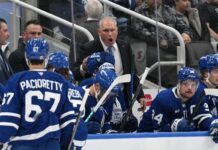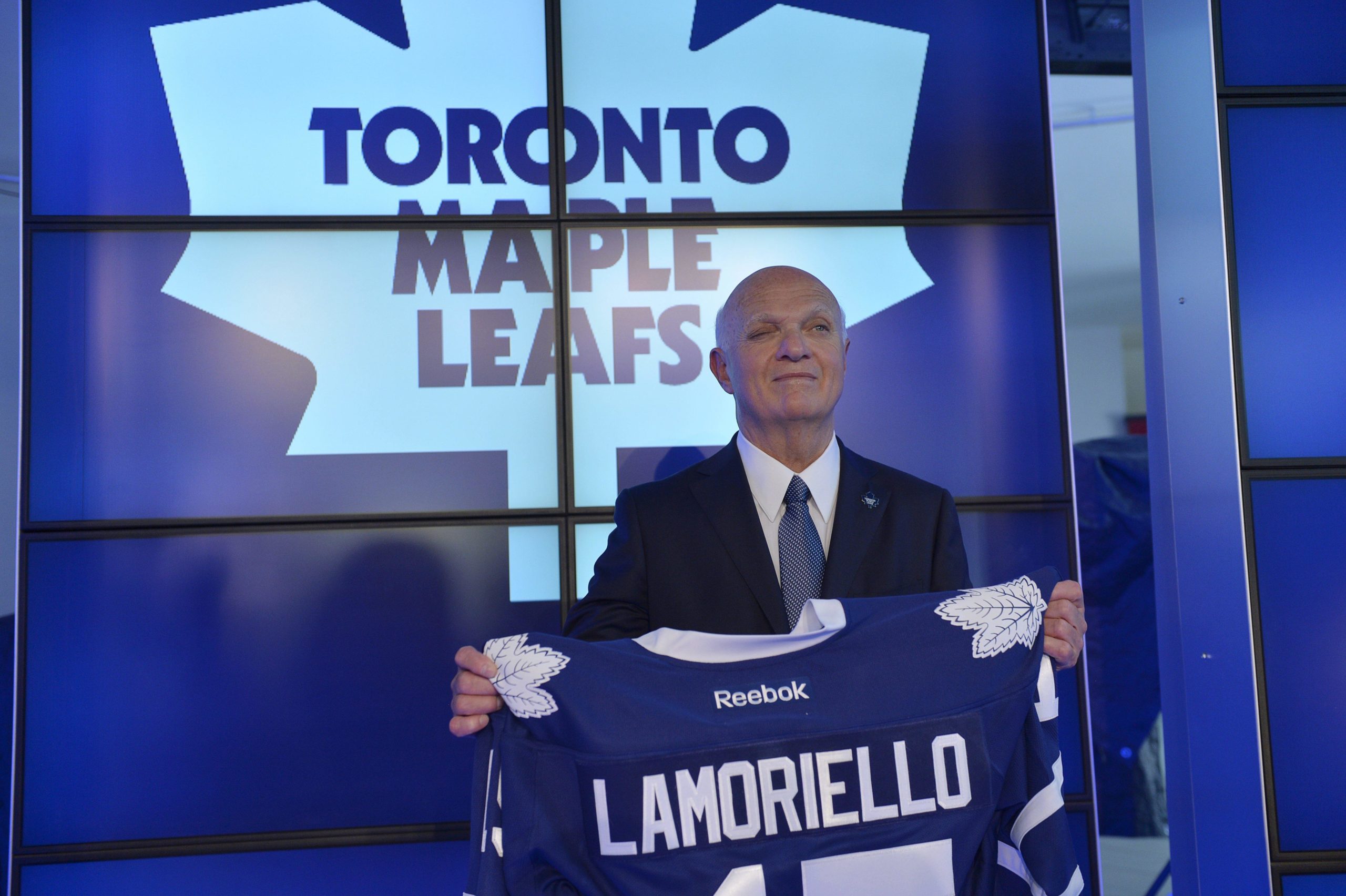Lou, I want to ask you about the new chief executive officer there at MLSE; the President that was hired earlier today. Michael Friisdahl has been tapped by MLSE to take over with Tim Leiweke moving out. Have you met the man yet? How do you think this will impact business going forward specifically for you and Brendan Shanahan?
Lamoriello: I have not met the new CEO, but it is my understanding that he is a very astute and accomplished individual in the business world. I’m looking forward to meeting him. As far as what effect it will have on the hockey operations, it is my understanding it will not have any.
You go back with a bunch of different ownership groups. Mr. McMullen in New Jersey – you had great success with that ownership group. How important is it, in the grand scheme of things, to have the guidance from the top and the support from the top, and the respect that starts, really, at the top?
Lamoriello: There’s no question of its importance. I think we’re very fortunate here in Toronto with Larry Tanenbaum, who I have known for a good period of time. I served on the executive board with him in the NHL when I was in New Jersey. And also the other gentlemen, along with Larry, who really oversee everything. Larry is our direct contact and certainly, with my stay here, has been nothing but exceptional.
The team made a couple of moves today. What went into the contract for Rich Clune?
Lamoriello: Richard certainly brings a certain dimension to any hockey team. He has enthusiasm, he has a feistiness about him. I think that maybe that can give us a little shot in the arm. We’re not expecting anything other than energy out of Richie. Certainly, hopefully that’s what we get.
After the game the other night, Mike Babcock was very complimentary of Bryon Froese. Tell me about Rich Clune and Byrone Froese in terms of what they offer in terms of work ethic. The hope is that that permeates throughout the dressing room, right?
Lamoriello: I think that the dressing room has been great as far as the work ethic. Mike and our coaching staff has done a tremendous job of getting our players to buy into the idea you can’t just work a shift here or a period here. It has to be done all the time, every night. I think that, when some people have not been used to that, you will go through different phases where, because you’re not accustomed to bringing it every single shift and every night, you fall back a little. I think these two gentlemen, with their past and what they’ve overcome, bring that night in and night out. I think that will add to what is there. As far as character and work ethic, they’re second to none.
The Leafs have some key players in their organization that aren’t up with the big club yet, specifically William Nylander and Mitch Marner. What did you see out of these two young men at camp?
Lamoriello: First of all, Marner is back in junior, and I think that’s going to do him a world of good there. As far as Nylander, there is no question of his talent and skills. He will be a Leaf before you know it. What he is going through in the minors, as far as developing other parts of his game other than his natural skill, will be helpful when he gets there. Also, prior to him coming here, we have to make sure the environment – the locker room, everything – is in place so that when a young player comes in he’s getting the right guidance and the right leadership to have success.
You would’ve seen a lot of Nylander’s father when he was playing with the Rangers and you were in New Jersey. Does he do anything that reminds you of his dad?
Lamoriello: Yeah, I did see maybe too much of his dad some nights. Extremely skilful, high-level hockey sense, and can make people around him better because of his depth perception of the game and of the ice.
Jeremy Bracco, another one of your prospects, left Boston College after a handful of games. He’s gone to the OHL to play for a very good Kitchener Rangers team. Certainly the organization had some guidance, perhaps, or some input into this decision for the young player. Tell us about that. I know that you’ve been a huge, for obvious reasons, collegiate supporter over the years, but why was the time right for him to make the jump into the O?
Lamoriello: First of all, the organization and no individuals in the organization had any influence on him leaving Boston College for him to go to junior. These are the decisions that are up to the individual and their families. He made this decision on his own. In fact, I found out about it the night before. There was no one in our organization that found out anything other than the night before. Also, I spoke to Jeremy’s past coach at Boston College, and he felt it was a complete surprise to him. This was a decision that, evidently, the young man went through back in the summer, made a decision to go to college, and for whatever reason – I have not spoken to him since this decision has been made so I really will not know what the reasons are until I sit down with him – but he left the next morning and went to Kitchener. He’s certainly a talented individual. This was his choice, and hopefully it’s in his best interest and, long term, in the best interest of the Maple Leafs.
I’m wondering, in your previous GM meetings, if you were a proponent of the League switching over to the three on three in OT? The Leafs have played a few overtimes. How have you enjoyed the three on three sessions?
Lamoriello: I didn’t enjoy it when we didn’t win with it. Unfortunately, our two games went to shootouts. I am a proponent of it. The main reason is because I do not feel a game should be decided by a shootout. I’d rather see it closer to the normal game that we have, although obviously three on three is extremely infrequent in games. But I think it brings an exciting part to it. It’s a high level skill, but not just with the goaltender and one player. It’s three players plus the goaltender on each side. I’m a proponent of it for the main reason of not wanting games to be decided on a shootout.
Everybody says wait for a couple of years and you’ll see what this team is really about, when they become a playoff contender and a consistent Stanley Cup contender. Of course, the players don’t want to hear that. Mike Babcock certainly doesn’t want to hear that. What do you hope to gain from this season in terms of the culture you want to build here?
Lamoriello: First of all, no one wants to hear that. I don’t think any player or any coach – every night, and each night, they’re there to win. They’ll do everything in their power to win and the players are doing that. The word culture is sometimes overstated, certainly, but underdeveloped. I think that what we’re trying to do is put together an organization and build how a player should play, how he should be with his teammates, and that the logo on the front of the jersey becomes the most important thing. There’s a reason it’s on the front of the shirt. As far as off the ice – how an individual should act, how they should handle themselves, how they should represent the organization, but more importantly how they should represent themselves. If they do that correctly, they’re going to do it for the organization. I think that we’re all committed to doing each and every one of these things. It’s going to be a foundation that has to be developed. What we’re going through right now is a process of finding out which and what players we have here who will be a part of that. It will be a process, but it’s not one where you say, “just look forward to the future.” The process is ongoing. Hopefully you can see evidence of it in just the style that Mike has out there, the commitment that the players have given to their work ethic. In my opinion, there should be better results; they’ve deserved it. Hopefully, over time, that will take a toll as far as getting those results.






























![Craig Berube Post Game, Leafs 6 vs. Sabres 3: “Our team played really hard in front of [Murray]… They were dialed in for him” Craig Berube, Toronto Maple Leafs head coach](https://mapleleafshotstove.com/wp-content/uploads/2024/12/berube-leafs-tor-pg-100x70.jpg)


